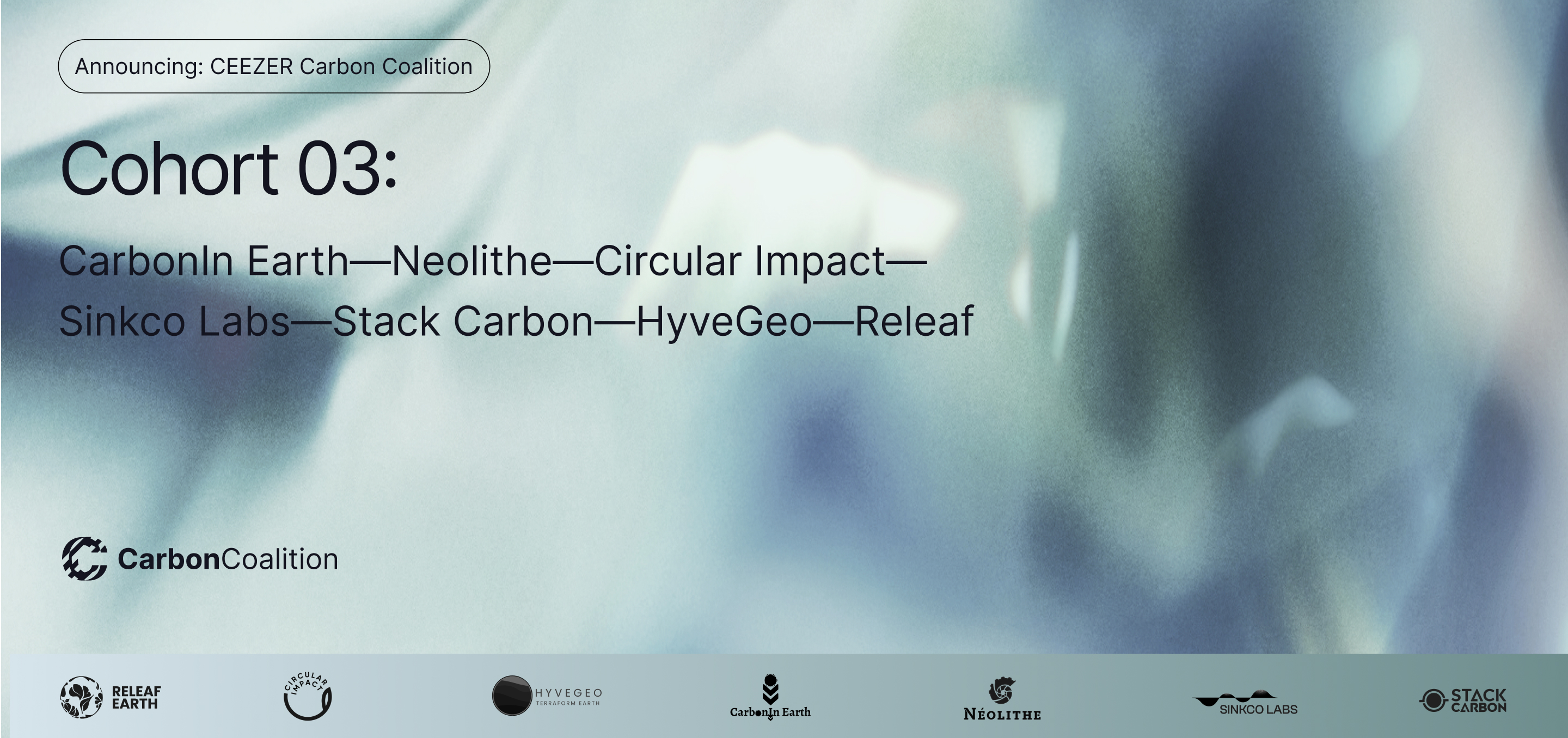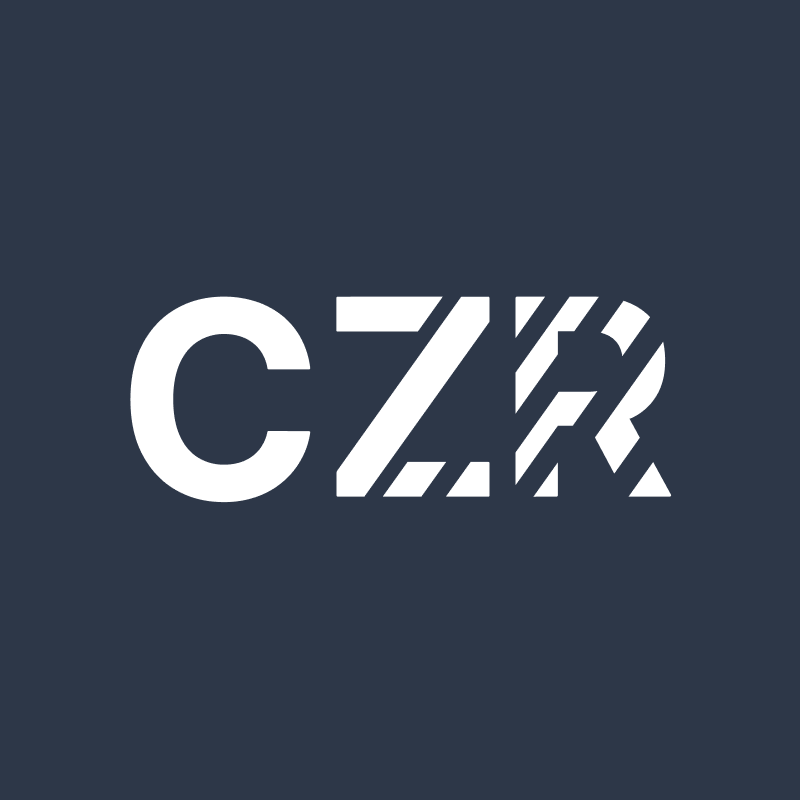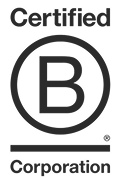CEEZER is thrilled to introduce Cohort 03 of durable carbon dioxide removal (CDR) startups joining the third edition of The CEEZER Carbon Coalition accelerator program.
The CEEZER Carbon Coalition provides startups in the voluntary carbon market (VCM) with the tools needed to bridge the gap between ideation and commercialization. It tackles common challenges faced by project developers, including increasing buyer awareness, understanding buyer needs, navigating contracts and registries, inventory management, and carbon credit pricing.
Introducing Cohort 03 of the CEEZER Carbon Coalition accelerator
The CEEZER Carbon Coalition welcomes early-stage project developers with innovative, scalable CDR solutions. The program is tailored to startups who are looking to commercialize, successfully enter the VCM, and rapidly begin scaling their carbon removal capacity by issuing high-quality carbon credits.
For Cohort 03, CEEZER received over 60 applicants representing 35 different countries, 5 continents, and 12 project types. The quality of projects was phenomenal, with the top 5 most popular project types being:
- Biochar - 45 percent
- Ecosystem restoration - 31 percent
- Other land use and soil - 22 percent
- Biomass burial - 13 percent
- Enhanced rock weathering (ERW) - 11 percent
Note: Total exceeds 100 percent because applicants were allowed to select multiple project types.
After careful review, CEEZER is excited to share the seven startups joining Cohort 03 of the CEEZER Carbon Coalition:
CarbonIn Earth is pioneering Biomass Fossilization, a low-cost, highly durable, breakthrough carbon removal solution that locks biomass waste into permanent storage by replicating natural fossilization.
Neolithe’s proprietary Accelerated Waste Fossilization technology transforms non-recyclable, non-hazardous waste residues into “Anthropocite” aggregates to reuse in the construction sector as a substitute for natural quarried aggregates. Learn more
Circular Impact partners with Regen Organics to convert sugarcane bagasse into biochar before blending it into Regen Organics' existing organic fertilizer products, scaling carbon removal while enhancing soil health through biochar-infused organic fertilizers. Learn more
Sinkco Labs harnesses the untapped potential of the seafloor to deliver safe, permanent, and scalable carbon storage while improving coastal resilience. Learn more
Stack Carbon’s ERW project leverages the natural mineralization process to sequester CO₂ while enhancing soil health and supporting local communities. Learn more
HyveGeo greens the desert to remove CO₂ from the air while boosting food security in arid regions. It turns locally-sourced agricultural residue into a biochar-based formulation that regenerates desert sand into arable land and locks carbon in the soil. Learn more
Releaf specializes in producing premium biochar from waste nut shells for smallholder yield improvement and carbon sequestration. Its patented method of biomass collection has enabled Releaf to become the largest nut de-sheller in the region. Learn more
Selecting the final seven
Choosing participants proved challenging, given the exceptional quality of the 60+ applications received. After careful review, seven projects were selected against five key criteria, which indicate the startups with the greatest potential for program success:
- Impact potential: The startups potential for real, scalable carbon removal with strong technological readiness as well as social and environmental impact
- Demand potential and business validity: There is a clear market for the startup’s credits, which it can deliver at a competitive, sustainable price
- Innovation and uniqueness: The startup is bringing something new the VCM
- Expertise and execution: The startup has the right team, expertise, and implementation plan in place for long-term success
- Program fit: The startup is positioned and ready to gain the maximum benefit from the program
“Kicking off the third iteration of this program, our team continues to be incredibly impressed by the quality and quantity of applicants. It’s exciting to see the enthusiasm and technical expertise these startups bring to the VCM, and we are excited to support our finalists on their commercialization journey,” said Dr. Carla Woydt, CEEZER’s Chief Impact Officer.
Addressing market entry challenges
The CEEZER Carbon Coalition directly responds to the growing demand for high-quality carbon removal solutions. By providing resources and support to access enterprise-level customers, the program helps these promising startups overcome critical commercialization barriers.
Participant survey results highlight the most valuable aspects of the program, with applicants identifying their top priorities:
- Creating buyer awareness
- Wanting a better understanding of buyer needs
- Needing guidance on carbon credit pricing
- Needing support in contracting
- Gaining broader market insights
The program addresses these priorities while tackling what applicants cited as their three biggest challenges: securing funding, generating market interest, and connecting with committed buyers.
Ambitious climate impact goals: would remove 3.5M tons by 2030
The seven companies in Cohort 03 are expected to remove a collective 7,000 tons of CO₂ by 2025, with ambitious scaling plans in place to reach 3.5 million tons by 2030. As demand for durable carbon removal technologies continues to grow, these startups represent some of the most promising teams actively expanding the voluntary carbon market.
CEEZER is always looking for the next groundbreaking project developer, whether established or just starting out. The application window for Cohort 04 is expected to open in late 2025. To learn more, visit the CEEZER Carbon Coalition program page and subscribe to receive updates on the next application window.






